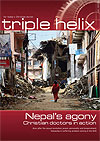Review by Philippa Taylor
CMF Head of Public Policy
Recent reports (1) have added to an evolving story of inadequate research into the HPV vaccine that almost every teenage girl in the UK has been given since 2008. (2) Apparently, thousands have endured various debilitating illnesses after receiving the routine injection. Interestingly, Japan stopped recommending this vaccine in 2013 because of side effects. Concerns have also been expressed recently in Australia. (3)
This issue presents a dilemma. Vaccination always involves balancing risks and benefits. Risks from mass vaccination of young girls must be weighed against the increasing incidence of cervical cancer, which claims thousands of lives worldwide. A vaccine that helps prevent this is to be welcomed. To deny it could be foolish, and potentially very harmful to many young girls at risk.
But there is still little long-term research on the effects of the vaccine. One study stated in 2008, when the vaccination programme started in the UK: 'There were definitely promising results...but more long-term studies were called for before large-scale vaccination programmes could be recommended'. (4)
A BMJ case study on ovarian failure in a teenager led to concerns about compromised research on vaccine safety. (5) These included: underrepresentation of the target age group, incomplete and short-term follow-up, and non-reporting of new medical conditions after seven months. This all: '...compromised safety studies' observation of ovarian health.' (6)
30% of cervical cancer can still occur in vaccinated individuals. This means screening is necessary for sexually active women. So is there any advantage over routine screening? Could it increase risk taking amongst adolescents who consider themselves protected, especially since the primary cause is downplayed (that girls are only at risk once they become sexually active)? Will vaccinated girls be less likely to pursue vital screening?
I am not against the vaccine per se. But I am concerned about inadequate research on safety, unreported side effects, lack of information about risks and young girls making decisions at an impressionable age. This, together, undermines principles of informed consent. Importantly, the context in which the vaccine is promoted fails to advocate any preventative approach, namely sexual abstinence and faithfulness. While I support its use for those at high risk, should it be imposed on all girls (which it effectively is), particularly when regular screening could prevent 90% of malignancies?7 Christians have a responsibility to promote premarital abstinence and marital faithfulness. Parents will have to weigh up the issues carefully, in discussion with their daughters, to decide whether they should be vaccinated, to protect them from their or indeed others' sexual immorality.
































